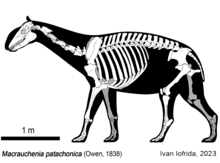Loading AI tools
Family in the extinct South American ungulate order Litopterna, that resembled various camelids From Wikipedia, the free encyclopedia
Macraucheniidae is a family in the extinct South American ungulate order Litopterna, that resembled camelids. They had three functional digits on the fore and hind feet, as well as elongate necks. The family is generally divided up into two subfamilies, Cramaucheniinae (which may be paraphyletic) and Macraucheniinae. The family shows retraction of the nasal region, most extremely to the top of the skull in derived macraucheniine taxa like Macrauchenia.[2] which has been interpreted to have supported a probsocis, perhaps like that of a saiga antelope to filter dust, or a moose-like prehensile lip.[3] The earliest unambiguous members of the family date to the late Oligocene around 30 million years ago. Polymorphis from the Eocene has historically been placed as a macraucheniid, but this has been doubted.[2] Most early representatives had a body masses in the range of 80–120 kilograms (180–260 lb), though some like Llullataruca were as small as 35–55 kilograms (77–121 lb), and the last representatives of the family from the Pleistocene like Macrauchenia were over 1,000 kilograms (2,200 lb).[4] The family reached its apex of diversity during the late Miocene around 10-6 million years ago, before declining to only a few species belong to the genera Macrauchenia and Xenorhinotherium by the Late Pleistocene.[2]
| Macraucheniidae | |
|---|---|
 | |
| Skeleton of Macrauchenia patachonica | |
 | |
| Skeleton of Thesodon | |
| Scientific classification | |
| Domain: | Eukaryota |
| Kingdom: | Animalia |
| Phylum: | Chordata |
| Class: | Mammalia |
| Order: | †Litopterna |
| Superfamily: | †Macrauchenioidea |
| Family: | †Macraucheniidae Gill, 1872 |
| Subfamilies and genera | |
| |
Below is a phylogenetic tree of the Macraucheniidae, after McGrath et al. 2018:.[5]
Cladogram of Macraucheniidae after Lobo, Gelfo & Azevedo (2024)[2]:
Seamless Wikipedia browsing. On steroids.
Every time you click a link to Wikipedia, Wiktionary or Wikiquote in your browser's search results, it will show the modern Wikiwand interface.
Wikiwand extension is a five stars, simple, with minimum permission required to keep your browsing private, safe and transparent.